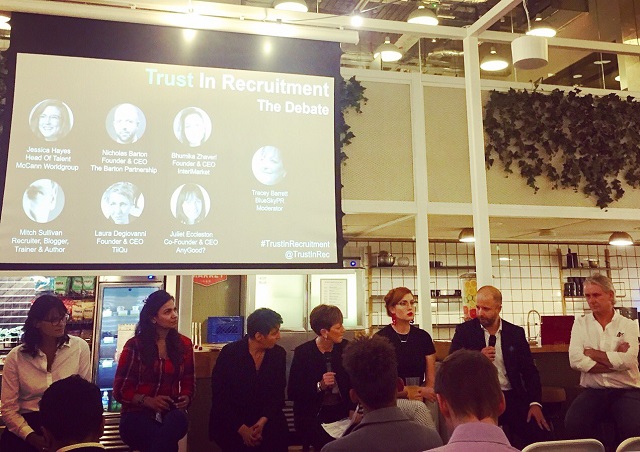This post was written by our Co-Founder JuIiet Eccleston
As I’m sure most of you have been eagerly anticipating, we’ve released the results of our Trust in Recruitment debate which took place earlier this month. In my last blog I alluded to the fact that it was a highly-charged discussion, and the results certainly reflect this. While I won’t go into the full arguments that came to the fore in this blog (one article alone wouldn’t be enough to cover everything anyway!), I can share with you the biggest outcome in my view: an agreement that a new model needs to be developed.
With our recent independent research revealing that 52% of people don’t feel they’ve been treated honestly in the hiring process and now this debate highlighting that almost everyone across the industry feels existing methods aren’t sustainable, the need to disrupt the norm and drive change is now more critical than it’s ever been. While there was certainly a mix of opinions as to exactly what needs to be done and who owns this movement, it’s safe to say that a new model is needed that empowers clients and candidates and equips them with the tools to be able to confidently call-out dodgy hiring practices.
Exactly what this looks like and how it is controlled going forward is something that will form the next stage of our campaign, but there was an agreement that any recommendations should be built around four critical elements:
- Greater transparency for clients of fees and clearer guidance on the makeup of alleged diverse talent pools
- Recruitment solutions operating as an ecosystem of partners rather than agencies working in competition
- Greater awareness of solution options for clients
- A way for candidates to understand the quality criteria recruiters are held against and guidance on how to call out bad practice behaviour.
I believe that we’re only at the beginning of this journey and I can certainly say that my involvement in driving better practice in the industry isn’t finished yet. The next phase of our Trust In Recruitment campaign will be to bring together influential players in the industry to agree actions and how to enforce these in order to move this issue on. Someone needs to drive the disruption of recruitment as we know it, and I’m more than happy to lead this for the benefit of the one audience that is most affected by poor practice but also has the quietest voice in developments: candidates.
For more information on the Trust In Recruitment campaign and a copy of the full debate analysis, visit: //trustinrecruitment.com/debate/


Recent Comments